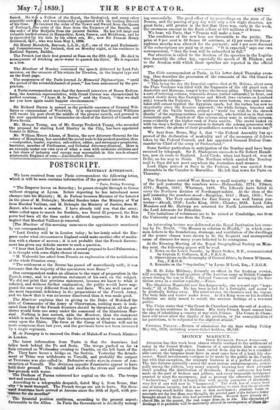POSTSCRIPT.
SATURDAY ArrEnNome.
We have received from our Paris correspondent the following letter, which it will be seen contains information of the greatest interest. We have received from our Paris correspondent the following letter, which it will be seen contains information of the greatest interest.
" Faris, Friday Evening.
4' The Emperor leaves on Saturday ; he passes straight through to Genoa without stopping at Lyons. Before departing he has introduced some changes into his Ministry ; M. de Padoue becomes Minister of the Interisr in the place of M. Delangle; Marshal Bandon takes the Ministry of War from Marshal Valiant, and M. Delangle the Ministry of Justice, from M. .Royer, who is made a senator. I have already told you that the army, when called upon to march for Sardinia, was found ill prepared, the Em- peror had been all the time under a different impression. It is for this neglect that Marshal Vaillant is removed.
[The Moniteur of this morning announces the appointments mentioned by our correspondent.] " Lord Cowley will be in London today ; he has lately asked the Em- peror under what circumstances England could make another offer of media- tion with a chance of success ; it is not probable that the French Govern- ment has given any definite answer to such a question.
"I hear that Lord Derby has made a second proposal to Lord Palmerston ; it is thought with some slight chance of success.
"M. Walewaki has asked from Prussia an explanation of the mobilization of the whole Prussian army.
" The settlement at the Bourse has passed off marvellously well; it was 'fortunate that the majority of the speculators were Bears."
Our correspondent makes an allusion to the want of preparation in the French army, and to a previous statement of his own on the subject. We did not print that previous statement, because we knew to what it referred, and without further explanation, the public would have sup- posed the case very different from the real facts. We are well aware of the most important deficiency in the preparations of the French Army, and we know that it was no sooner discovered than it was made good.
The Honitcur explains that in giving to the Duke of Malokoff the title of Commander of the Army of Observation, nothing more is indi- cated than that if the French frontiers should be threatened, all the gar- risons would form one army under the command of the illustrious Mar- sbal. Nothing is less correct, adds the .Monieser, than the statement which is made in Germany that the Government is about to assemble an army upon the Rhine. The force at the Camp of Chalons will not be more numerous than last year, and the garrisons have not been increased by a single regiment.
M. de Pereigny is to succeed the Duke of Malakoff as French Minister in London.
The latest information from Turin is that the Austrians had fallen back behind the Po and Sesia. The troops pushed as far as Sala returned on Wednesday evening to (Jambi°, on the left bank of the .Po. They have burnt a bridge on the Serivia. Yesterday the detach- ment at Trine was withdrawn to Vercelli, and probably the outpost at Tronzano was also called in. Defensive works were in course of con- `strnetion at Vercelli. The envisions opposite Frassinetto appear to have held their ground. The rainfall had ewollen the rivers and covered the 'low grounds with water.
The Duchess of Parma reentered her capital on the 4th. The troops inlet and received her.
According to a telegraphic despatch, dated May 5, from Rome, that city "is most tranquil. The French troops are not to leave. Six thou- ' sand Austrians have arrived at Ancona since The 80th of April, with pro- !vie' ions for six months/'
The financial position continues, according to the present aspect, favourable to the Allies. In Paris the Government is decidedly manag- lag successfully. The good effect of its proceedings on the state of tie Bourse, and the passing of pay day with only a few slight disasters, are great facts; still greater is the fact that there was, early in the week, the enormous amount in the Bank cellars of 525 millions of francs.
We hear, via Paris, that "Prussia will make a loan."
The conditions of the new loan are favourable to the public. The price at 3 per cent is 60 francs 50 centimes, at 41 per cents 90 francs : eighteen months was allowed for the payment ; and 4 per cent discount if the subscriptions are paid up at once. "It is expected," says our own correspondent, " that the loan will be subscribed in full."
Our attention is called to the freedom of the speeches in the Legisla- tive Assembly the other day, especially the speech of M. Pliebon ; and to the freedom with which those speeches are reported in the official paler-


























 Previous page
Previous page